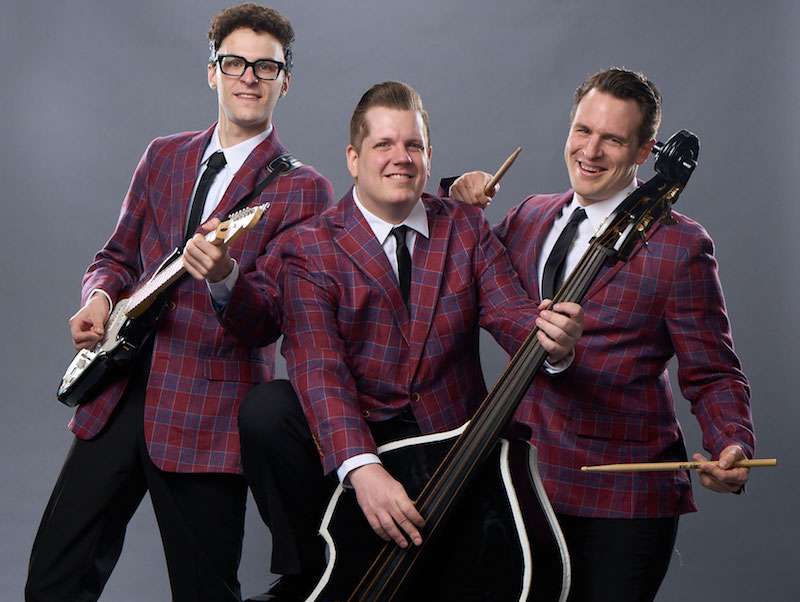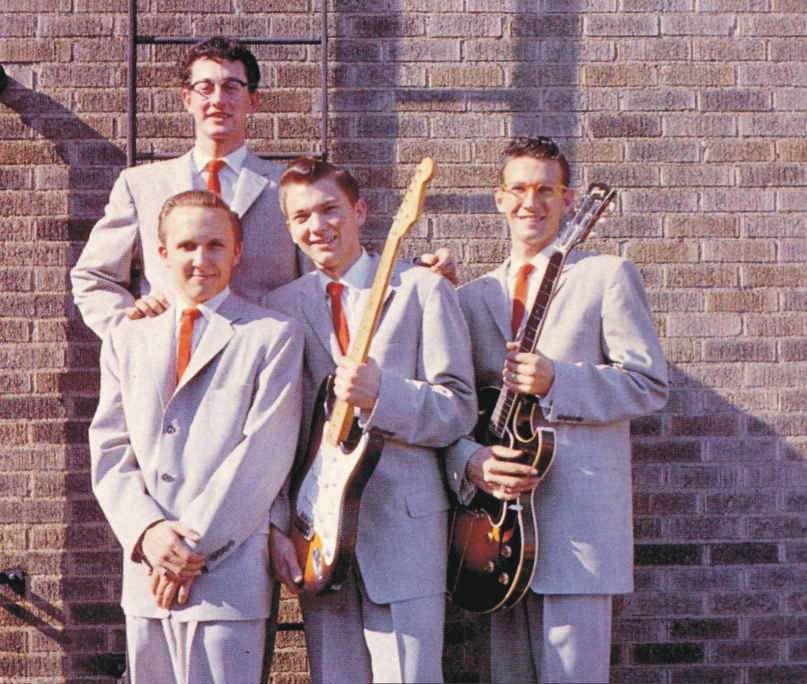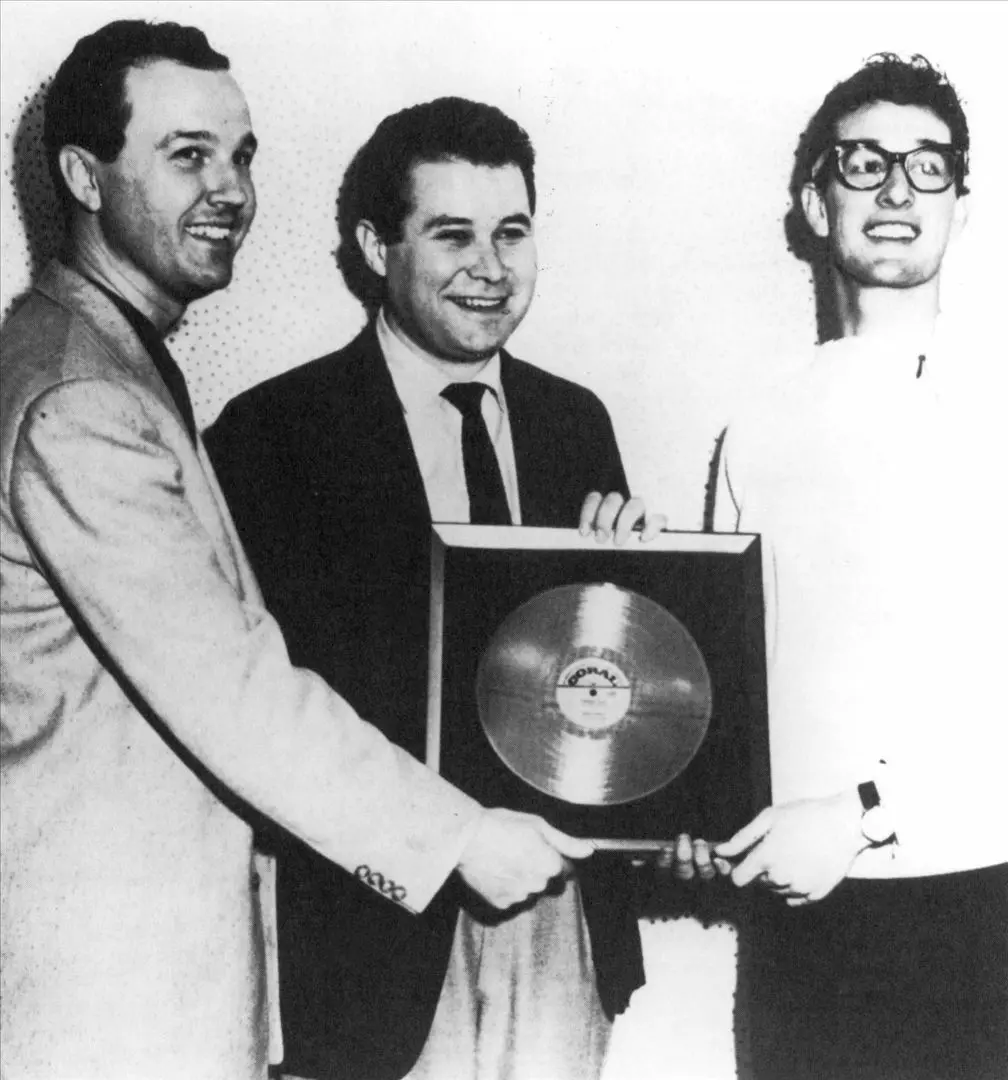
Buddy Holly – The Pioneer of Rock ‘n Roll

Photo source: Getty Images
More than 60 years after that cold February night, Buddy Holly still plays in the background of American culture. The man behind “Peggy Sue” wasn’t just a chart-topper, he was the prototype. Gone too soon, but never out of tune.
The Life and Legacy of Buddy Holly
Born Charles Hardin Holley in 1936, Buddy Holly didn’t come from a big city or a music hub, he came from Lubbock, Texas. A dusty town that echoed with country music and gospel choirs. By the time he turned 20, he’d turned that sound inside out, launching rock and roll into a new era.
In 1955, Buddy and his band, The Crickets, recorded their first hit single, "That'll Be the Day," which soared to the top of the charts.
The Buddy Holly Difference
Holly wasn’t just playing the game, he was rewriting the rules. Long before producers made it standard, he was experimenting with overdubs, double-tracking, and stereo illusions. In a time of one-take recordings, he chased perfection with tape and imagination. His blend of country, R&B, and hiccupy rockabilly didn't just work, it exploded.
Buddy Holly - Heartbeat: the last song released before his death.
The Day The Music Died - Buddy Holly's Death
February 3, 1959. Clear Lake, Iowa. A frozen runway, a rushed flight, and a sudden silence. Buddy Holly, Ritchie Valens, and J.P. “The Big Bopper” Richardson were gone. In one night, rock and roll lost its innocence and its first icon. The tragedy shook the music world and left fans devastated as they mourned the loss of one of his generation's most talented and innovative artists.
The Legend of Buddy Holly
Despite Buddy Holly's heartbreaking death, his music continues to inspire and influence musicians. Countless artists have covered his songs, and his legacy lives on through the Rock and Roll Hall of Fame, which inducted him in 1986. From "Everyday" to "True Love Ways," Buddy Holly's music remains a testament to his talent and creativity and a reminder of his profound impact on the music world.
As a creative professional, I can't help but be inspired by Buddy Holly's life and work. His passion, innovation, and dedication to his craft remind me that true greatness comes from talent, hard work, determination, and a willingness to take risks. Buddy Holly may be gone, but his music is a testament to his enduring legacy and impact on the world.

Photo Source: telegraph.co.uk
Buddy Holly's Influence on Rock and Roll
Here are a few ways in which Buddy Holly's influence can be seen in modern rock singers and songwriters:
- Melodic Songwriting: Buddy Holly was known for his ability to craft melodic and memorable songs. Many modern rock singers and songwriters draw inspiration from his approach to songwriting, focusing on strong melodies and catchy hooks in their compositions.
- Vocal Style: Buddy Holly's clear and expressive vocal style left a lasting impression. His influence can be heard in the vocal delivery of numerous rock singers who appreciate his passionate singing and phrasing.
- Storytelling in Lyrics: Holly's songs often told stories and conveyed relatable emotions. This narrative approach to songwriting has influenced modern rock singers who use storytelling as a critical element in their lyrics.
- Cross-Genre Appeal: Buddy Holly's music had a broad appeal, bridging the gap between rock and roll, country, and pop. Modern rock singers often explore a range of influences and genres, reflecting Holly's versatility.
- Guitar-Driven Music: While primarily known as a singer and songwriter, Buddy Holly's guitar work also left an impact. Modern rock singers who play guitar may incorporate elements of his guitar style into their music.
- Live Performances: Holly's energetic and engaging live performances set a precedent for modern rock singers regarding stage presence and connecting with audiences.

Photo Source: tuacahn.org
The Buddy Holly Influence on "The Gods of Rock"
British Invasion:
John Lennon and Paul McCartney both cited Buddy Holly as a significant influence. Holly heavily inspired the Beatles' early music approach to songwriting and band formation.
George Harrison: George Harrison was deeply influenced by Buddy Holly's music as a member of The Beatles. The Beatles covered several Buddy Holly songs, and Holly's simple and melodic style influenced Harrison's early guitar playing.
Keith Richards: The Rolling Stones' Keith Richards cited Buddy Holly influencing his guitar playing and songwriting. The Stones recorded a version of Holly's "Not Fade Away," they covered Buddy Holly's songs in their early days. Holly's influence can be seen in their rock and roll style and energy.
Guitar Icons/Gods:
Eddie Van Halen, the renowned guitarist and co-founder of the rock band Van Halen, once commented on Buddy Holly in an interview. He mentioned that Buddy Holly's music and guitar playing significantly impacted him. Eddie Van Halen credited Buddy Holly as one of the early influences that inspired him to pick up the guitar and start playing music.
Eric Clapton: The legendary blues-rock guitarist Eric Clapton has mentioned Buddy Holly as one of his early influences. Holly's music shaped Clapton's approach to guitar playing and songwriting.
Pete Townshend: The Who's Pete Townshend has acknowledged Buddy Holly's influence on his guitar work and songwriting. Townshend's use of power chords and aggressive strumming can be traced back to the early rock and roll style popularized by Holly.
American Storytellers:
Bruce Springsteen: Bruce Springsteen, known for his energetic live performances and songwriting, has mentioned Buddy Holly as an influence on his music. Holly's ability to write catchy, narrative-driven songs resonated with Springsteen's approach.
Bob Dylan was profoundly affected by Holly's music. He attended a Buddy Holly concert just days before Holly's tragic death, and Holly's influence can be seen in Dylan's early rock-influenced work.
Elvis Costello: Costello has frequently mentioned Buddy Holly as an influence, and his music often reflects Holly's blend of rock and roll and pop sensibilities.

Photo Source: strathdee.wordpress.com
Buddy Holly References in Pop Culture
From The Buddy Holly Story to Weezer's “Buddy Holly”, pop culture hasn’t let him fade. You’ll find him in Pulp Fiction, Back to the Future, and even The Simpsons. That’s not nostalgia, that’s staying power.
- "The Buddy Holly Story" (1978): This biographical film starring Gary Busey as Buddy Holly explores the life and career of the rock and roll legend. Busey's performance earned him an Academy Award nomination, and the film significantly contributed to the enduring image of Buddy Holly in popular culture.
- "Weezer (The Blue Album)" by Weezer: The cover art of Weezer's 1994 self-titled debut album, often referred to as "The Blue Album," features a picture of the band members dressed in sweaters and ties, reminiscent of Buddy Holly's style. The album includes the hit song "Buddy Holly," which nostalgically references Holly's influence and features a music video set in the iconic setting of the TV show "Happy Days."
- "American Graffiti" (1973): While not specifically about Buddy Holly, this classic coming-of-age film set in the early 1960s features a scene where the characters hear about Buddy Holly's death on the radio. The film's soundtrack also includes Holly's music, underscoring his impact on the youth culture of the time.
- "Pulp Fiction" (1994): In Quentin Tarantino's film "Pulp Fiction," the character Jules, played by Samuel L. Jackson, mentions Buddy Holly while discussing pop culture during the famous diner scene. Additionally, Steve Buscemi makes a cameo as a waiter dressed as Buddy Holly at the 1950s-themed restaurant Jack Rabbit Slim's.
- "American Pie" by Don McLean: Don McLean's iconic song "American Pie" contains the famous line "the day the music died," which refers to the tragic plane crash that claimed the lives of Buddy Holly, Ritchie Valens, and J.P. "The Big Bopper" Richardson in 1959. The song nostalgically reflects on the impact of Holly's death on rock and roll.
- "Peggy Sue Got Married" (1986): Directed by Francis Ford Coppola, this film features Kathleen Turner as Peggy Sue, who travels back to her high school years. There's a memorable scene where she meets Buddy Holly before he becomes famous, highlighting the timelessness of Holly's music and persona.
- "La Bamba" (1987): This biographical film about Ritchie Valens prominently features Buddy Holly, played by Marshall Crenshaw, and depicts the events leading up to the plane crash in Clear Lake, Iowa, which claimed the lives of Holly, Valens, and Richardson.
- "The Wonder Years": This coming-of-age series set in the 1960s and early 1970s featured episodes referencing Buddy Holly and his music, reflecting the show's nostalgia for the period and highlighting Holly's lasting influence on subsequent generations.
- "The Simpsons": In the episode "Love, Springfieldian Style," Homer and Marge Simpson attend a Buddy Holly-themed dance at their high school reunion, showcasing Holly's enduring popularity in American culture.
- "The Goldbergs": Set in the 1980s but with a strong appreciation for 1950s and 1960s pop culture, "The Goldbergs" references Buddy Holly and his music in several episodes, illustrating the multi-generational appeal of his work.
- "Gilmore Girls": In one episode of "Gilmore Girls," Luke and Lorelai attend a karaoke night, and Luke performs Buddy Holly's song "Oh, Boy!" This scene demonstrates how Holly's music continues to resonate in contemporary settings.
- "That '70s Show": Although the show is set in the 1970s, it often references the music and culture of the 1950s and 1960s, including nods to Buddy Holly. These references serve to highlight the show's characters' appreciation for the roots of rock and roll.
- "Happy Days": This TV series set in the 1950s occasionally features references to Buddy Holly and his music. As a show celebrating the era's pop culture, it naturally includes nods to one of the decade's biggest musical icons.
- "Back to the Future" (1985): While not primarily focused on Buddy Holly, the film features a humorous reference to him. In one scene, Marty McFly, played by Michael J. Fox, introduces the song "Johnny B. Goode" at a high school dance by saying, "This is a blues riff in 'B,' watch me for the changes, and try to keep up." This scene underscores Holly's influence on the evolution of rock and roll.
- "Quantum Leap": In the episode "How the Tess Was Won," Sam Beckett (Scott Bakula) leaps into the body of a veterinarian in Texas in 1956. During the episode, Sam meets a young Buddy Holly and inspires him to write the song "Peggy Sue."
- Literature: Buddy Holly's music and legacy have been referenced in various books, including novels, biographies, and music histories. For instance, "Rave On: The Biography of Buddy Holly" by Philip Norman provides an in-depth look at Holly's life and impact on music.

Photo Source: iheart.com
These references showcase Buddy Holly's lasting influence and significance in entertainment and popular culture. His contributions to music and style continue to be celebrated and remembered.
The Buddy Holly Interview to Remember
In one of his last interviews, Buddy Holly spoke about evolving as an artist and pushing rock forward. Just a few months later, that voice was gone, but the tape lives on, capturing the mind of a man who wasn’t just making music, but shaping the future.
Paul Colburn conducted one of the most famous interviews with Buddy Holly for the "KLLL Pop Shop" radio show in Lubbock, Texas, on October 18, 1958. This interview is notable not only for its content but also because it is one of the last known interviews with Buddy Holly before his tragic death in a plane crash on February 3, 1959.
In this interview, Holly discusses various aspects of his career, including his music, songwriting, and plans. He also talks about his influences, his desire to continue evolving as an artist, and his experiences in the music industry.
The interview provides valuable insights into Buddy Holly's thoughts and aspirations at a critical juncture in his career. It captures his enthusiasm for music and the evolving rock and roll scene of the late 1950s. Tragically, Holly's life was cut short just a few months later, but his music and interviews like this one continue to be treasured by fans and historians as a glimpse into his life and creative process.

Photo source: bestclassicbands.com